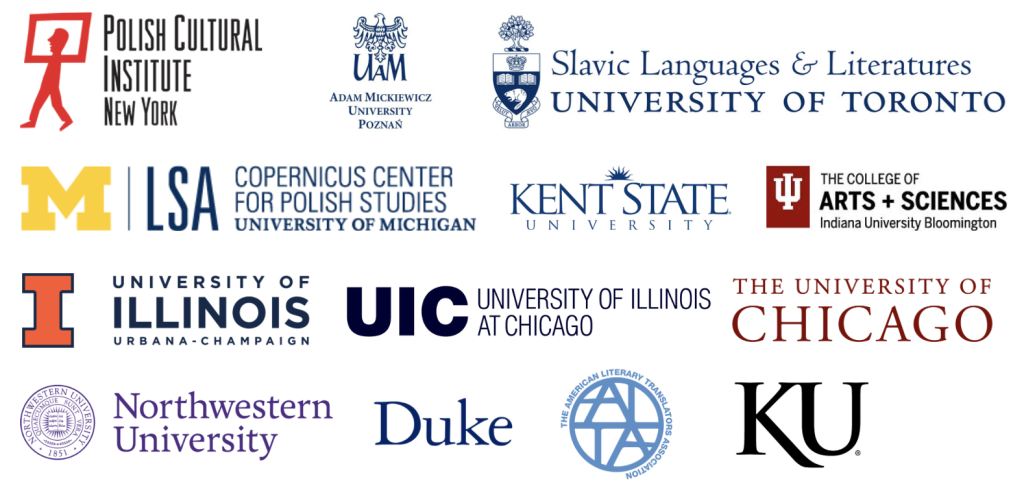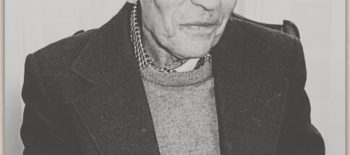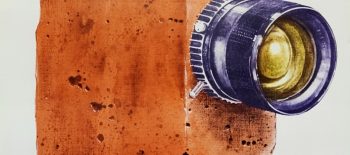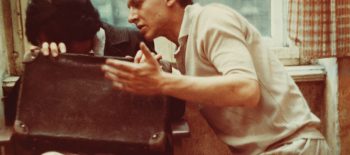April 1, 2022
Watch this episode on our YouTube channel.
Episode 15 and all video recordings are available at:
Polish Cultural Institute New York YouTube
Encounters with Polish Literature is a video series for anyone interested in literature and the culture of books and reading. Each month, host David A. Goldfarb will present a new topic in conversation with an expert on that author or book or movement in Polish literature. More about the Encounters with Polish Literature series and the timeline.
The wholesale invasion of Poland’s neighbor, Ukraine, by the Russian military on February 24, 2022 opened a new chapter in European history and in Poland’s relationship with Ukraine. We’ve seen an outpouring of international grassroots support for Ukraine in the face of Russia’s aggression, and for the millions of Ukrainian refugees fleeing the war, most of them crossing the Polish border. Polish citizens have proven themselves capable and agile, taking the helm to offer food, lodging, and transportation for refugees at the border, often at significant personal expense.
How do Ukrainian and Polish literature reflect the shared history and shared trauma of the two countries that have not always had such a comfortable relationship as they do today? Beginning with this episode, we are opening our platform and adjusting our calendar to make space for discussion of Ukrainian literature and Polish-Ukrainian literary relations.
Yuri Andrukhovych (b. 1960) was born in Ivano-Frankivsk in western Ukraine, not so far from Drohobych, the birthplace of Bruno Schulz who has come to represent a significant monument in Andrukhovych’s literary landscape. He has written poetry, fiction, and essays, and has created a distinctive genre of performance beginning with the L’viv poetry group, Bu-Ba-Bu, and extending to his more recent performances with the Polish band, Karbido.
In this episode we discuss Andrukhovych’s connections to Schulz, Witold Gombrowicz, and contemporary Polish writer Andrzej Stasiuk. From Schulz, Andrukhovych develops a sense of the relationship between objects and their underlying mythologies. With Gombrowicz, he shares an inclination toward self-conscious play with literary history. Andrukhovych and Stasiuk have long been personal friends engaging in an ongoing dialogue about geography and history in East Central Europe, beginning in print with two essays published in Polish as Moja Europa (My Europe) in 2000. We get a glimpse of some exclusive footage of Andrukhovych performing with Karbido at the Bruno Schulz Festival in Drohobych in 2012. Finally, we look at Andrukhovych’s poem, Set Change, recently published in English translation in The New York Review of Books, which, like Adam Zagajewski’s poem, “Try to praise the mutilated world,” is a poem written much earlier under different circumstances, but has taken on a new meaning in light of a world-changing act of violence.
For students interested in studying Ukrainian literature and culture, Prof. Vitaly Chernetsky gives a brief overview of the program at the University of Kansas. [https://slavic.ku.edu/]
Selected works by Yuri Andrukhovych in English translation:
The Moscoviad. Tr. Vitaly Chernetsky. New York: Spuyten Duyvil, 2008.
My Final Territory: Selected Essays. Tr. Mark Andryczyk and Michael M. Naydan, with one essay tr. Vitaly Chernetsky. Toronto: University of Toronto Press, 2018.
Perverzion. Tr. Michael M. Naydan. Writings from an Unbound Europe. Evanston, Ill.: Northwestern University Press, 2005.
Recreations. Tr. Marko Pavlyshyn. Toronto: CIUS Press. 1998.
“Samiilo, or the Beautiful Brigand.” Ukrainian Literature. Vol. 5 (2018), pgs. 9-16.
Songs for a Dead Rooster: Selected Poems. Tr. Vitaly Chernetsky and Ostap Kin. Sandpoint, Id.: Lost Horse Press, 2018.
Twelve Circles. Tr. Vitaly Chernetsky. New York: Spuyten Duyvil, 2015.
Kinsella, Ali; Tompkins, Zenia; and Ufberg, Ross, eds. Love in Defiance of Pain: Ukrainian Stories (including works by Yuri Andrukhovych and many other Ukrainian authors—click link for a full list of authors and translators). Dallas: Deep Vellum Press, May 2022. All proceeds from this collection are intended for humanitarian aid for Ukraine.
Additional Resources and authors mentioned in the episode:
Stasiuk, Andrzej. Dukla. Tr. Bill Johnston. Champaign, Ill.: Dalkey Archive, 2011.
—. On the Road to Babadag: Travels in the Other Europe. Tr. Michael Kandel. New York: Houghton Mifflin Harcourt, 2011.
Stasiuk, Andrzej and Haydamaky. Mickiewicz – Stasiuk – Haydamaky. Koncert w Trójce LIVE (in Polish and Ukrainian). Polskie Radio, Trójka.
Zhadan, Serhiy. Жадан і Собаки (Zhadan I Sobaki, “Zhadan and the Dogs” in Ukrainian). YouTube Channel.
Also see our previous episodes on Bruno Schulz and Witold Gombrowicz.
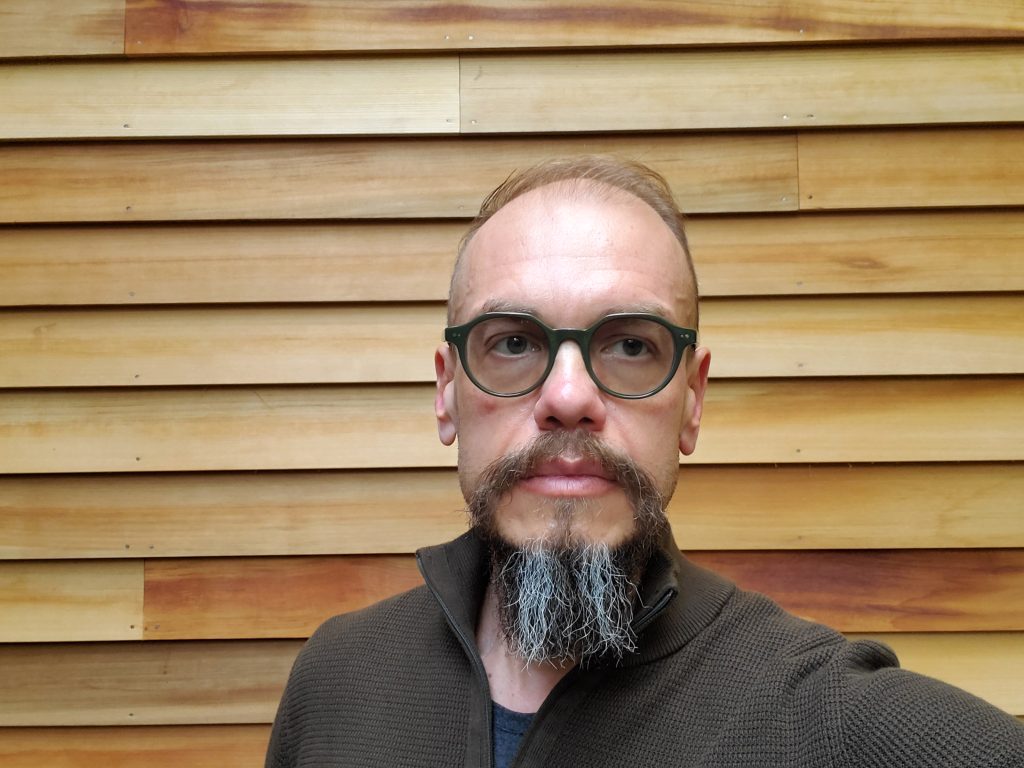
VITALY CHERNETSKY is a Professor of Slavic Languages and Literatures and an affiliate of Film and Media Studies, Jewish Studies, Science Fiction Studies, and Women, Gender and Sexuality Studies at the University of Kansas. A native of Odessa, Ukraine, he received his Ph.D. from the University of Pennsylvania and previously taught at Columbia, Northeastern, and Miami University (Ohio). He is the author of Mapping Postcommunist Cultures: Russia and Ukraine in the Context of Globalization (McGill-Queen’s University Press, 2007; Ukrainian-language version, 2013) and of articles on modern and contemporary Slavic and East European literatures and cinema where he seeks to highlight cross-regional and cross-disciplinary contexts. A book in Ukrainian, Intersections and Breakthroughs: Ukrainian Literature and Cinema between the Global and the Local,is in press. He co-edited a bilingual anthology of contemporary Ukrainian poetry, Letters from Ukraine (2016), and an annotated Ukrainian translation of Edward Said’s Culture and Imperialism (2007), and guest-edited a special issue on Ukraine for the film studies e-journal KinoKultura(2009). His translations into English include Yuri Andrukhovych’s novels The Moscoviad (2008) and Twelve Circles (2015) and a volume of his selected poems, Songs for a Dead Rooster (2018, with Ostap Kin). He is a past president of the American Association for Ukrainian Studies (2009-2018) and the current first vice president of the Shevchenko Scientific Society in the U.S.
Lead image: Yuri Andrukhovych at Schulz Festival on September 2012. Photo by David Goldfarb.
Bartek Remisko, Executive Producer
David A. Goldfarb, Host & Producer
Natalia Iyudin, Producer
